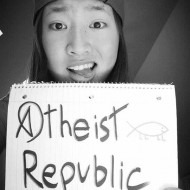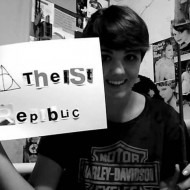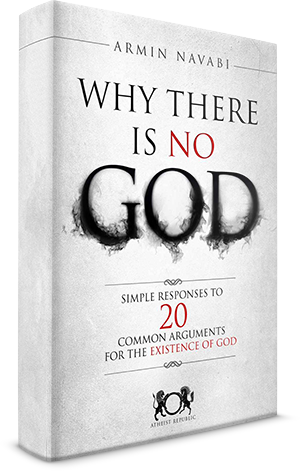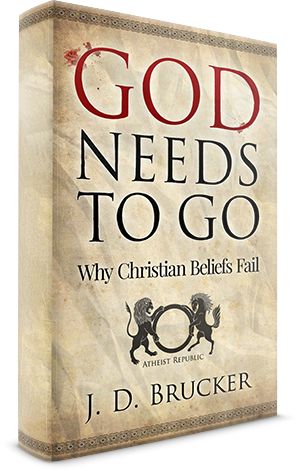The Atheist Test. Are you certain you are an atheist?
Donating = Loving
![]()
Bringing you atheist articles and building active godless communities takes hundreds of hours and resources each month. If you find any joy or stimulation at Atheist Republic, please consider becoming a Supporting Member with a recurring monthly donation of your choosing, between a cup of tea and a good dinner.
Log in or create an account to join the discussions on the Atheist Republic forums.




























ShitNrun2020?
No hit and run here, I only have time really in the mornings and on weekends to get on the forum. I am aiming to respond to more of the replies, but for now, will copy my response to Whitefire13 here, as many of you have addressed or asked for the fleck, and this response maybe helpful to you. Also, not sure if It will get lost at the top. so, here it is:
Thanks for your reply!
Bonus question: If you don't say "there is absolutely no God," does that mean you are open to the possibility that there is?
Did you know that if there was just a slight variation, and I mean tinier than nano, in the ratio between the strong nuclear force and the electromagnetic force, then no stars could have formed at all. This, paired with all the other odd-defying supposed coincidences which were perfectly placed in order for life to exist should substantial.
In other words, If you look out on any building, how do you know there was a builder? Even if the building was built 100 plus years ago and you have no other evidence of the life of the builder, you know the builder exists because of the building itself. Likewise, if you look at a painting, the painting itself is evidence that there was a painter, regardless of what you know, or don't know, about said painter.
So, building is to builder as painting is to painter, as creation is to: ?
Back to the top of the bonus question, if you don't make the absolute statement, "there is no God," are you open to the possibility, however slight you may believe that to be, that there is?
If so, you are not an atheist, but rather, an agnostic, simply meaning, you do not know weather or not there is a God.
@ answered at top :)
Copy and pasted here:
@Fish&Chips
...” does that mean you are open to the possibility that there is?”
I’m open at about a .01% for maybe something unexplainable that might be reckon’d a god - don’t really know though because nothing like that has been evidenced in this universe. I’m at a 0% for any god described by man.
...eg of universe forming “ This, paired with all the other odd-defying supposed coincidences ...”
It is mind blowing. Here’s putting it in perspective- you can think of all the sperm ejaculated and a woman’s monthly cycle. Now it’s only that “one sperm and egg” that made “you” (otherwise someone else would be here). If your dad had (excuse the crudeness) jacked off early morning “you’d be nonexistent”. Follow this back to grandparents, etc... fuck, you shouldn’t be here. Do you know what the odds are for your very existence by a natural sex act?!?! It’s crazy. Yet you are here. So is the universe.
... “If you look out on any building, how do you know there was a builder?”
Read of course the whole paragraph ;)
But, from what I understand, I could look at the building and say “Hey, this is proof that there is a greater invisible building making buildings in its image...”
I don’t get much into labels. “Agnostic” maayyybbbeee with the whole I don’t know (.01% something) ... atheist fully when it comes to man’s idea of god or “knowing” this “something”.
Is the relation between them dependent or independent? Also, what is a nano in this context?
-------------------------------
Atheist and agnostic are not exclusive; you can be both.
-------------------------------
And why are you posting the same message more than once? It's spam, don't do it.
Quantum of light is the measurement I think he is referring too. Which is how to measure fields. Smallest however would a a planck constant unit. Other than zero evidenced association/measurement of any god ever, WTF do fields have to do with gods? Why is god fanboy even bringing this up...its quite fallacious.
Well I'm just curious because nano is a prefix; so I was a little surprised to see a "naked prefix".
I really wish people would not expose their naked prefix's in public, thank you very much.
I sorta like looking at them. Just sayin’
Naked prefixes aren't so bad. But those damn dangling participles can sometimes be rather revolting.
RE: Dangling participles: Oozing slowly across the floor, Tin Man saw the oil that was his life blood. Waiting for assistance, his head became light and he began to faint. When coming out of the trees, the faint was thwarted by a well placed missile of poo. Forever grateful, Tin's ass was saved one more time.
@doG
"I really wish people would not expose their naked prefix's in public, thank you very much."
Absolutomundo
If that is allowed , the next thing will be people exposing their shortcomings in public by streaking.
@fishfry
"Bonus question: If you don't say "there is absolutely no God," does that mean you are open to the possibility that there is?"
I am open to all possibilities...However, by rational convention, I tend to not believe in things without objective evidence. As zero, of said evidence, exists for any god, that places me squarely within the atheism definition.
"Back to the top of the bonus question, if you don't make the absolute statement, "there is no God," are you open to the possibility, however slight you may believe that to be, that there is?"
Again, being open to possibility, does not define belief. You can be open to a possibility...of aliens, of world peace (not likely with religion existing), time travel, even of a god...however it does not mean we believe in any of those things. We can however, say we do not believe in things, solely based on objective evidence of existence in reality. If there is none, it is unreasonable, irrational, and in specific cases, delusional, to do so.
Possibility is a measure of likeliness...when likeliness reaches 100%, that is when possibility becomes belief (in rational people).
Now tell me why you believe in your version of a god?
Then we can discus your rationality after that.
Or...
Maybe you would like to end this discussion once and for all, by presenting clear objective evidence of the existence of your version of a god?
@ FishNChips007
"So, building is to builder as painting is to painter, as creation is to: ?"
Not at all. We know from past experiences, including even watching buildings under construction, the origin of such constructs. But we do not have any emerging universes to compare against, so to assume it was created is just that, an unevidenced assumption.
@Fishy: RE: "If you don't say "there is absolutely no God," does that mean you are open to the possibility that there is?"
Anything is possible. I have 2000 years of failed Christian apologetic. I have 10,000 years of failed Gods. I have 1/3 of the Christians telling me the other 2/3 are going to burn in hell for worshiping false gods. I have a Bible with a god in it that the theists call loving who endorses slavery, butchers babies, forces women who are raped to marry their rapist, endorses killing children if they talk back, calls gay people deserving of death, wants to kill witches, who thinks a blood sacrifice is needed to make any kind of change and you want me to believe in this fantasy troll? Why? You produce the evidence and we will all believe. That in no way implies we will worship the son of a bitch!
@FISHY: RE: " You know the builder exists because of the building itself. Likewise, if you look at a painting, the painting itself is evidence that there was a painter, regardless of what you know, or don't know, about said painter."
We know people paint and build buildings, THAT'S HOW WE KNOW THEY ARE BUILT. We know things are built because they are different from NATURALLY OCCURRING! Things that occur naturally, like the weak and strong nuclear forces, are what we base the observational scientific laws upon.
Before you jump to the erroneous assumption that your god put laws into motion, the laws as we know them are descriptive of the world we live in and not prescriptive. If they were Prescriptive, THEY WOULD NOT BREAK DOWN ALL THE TIME AND WE WOULD UNDERSTAND EVERYTHING. The laws work when they work and do not work when they do not work. That is the way the universe is. When they don't work, we EXPLORE and try to find new ways of seeing what is. THERE IS NO LAW GIVER until you offer evidence for such a claim.
ALL THE EVIDENCE is stacked against you. There is more evidence for a person asserting that there is no god than there is for someone contending that there is.
@FishNChips007: Did you know that if there was just a slight variation...
If there had been such a variation, we wouldn't be here talking about it. Who knows how many other universes have formed with other parameters under which stars or life couldn't evolve?
The processes that led to us were indeed very unlikely. So why do you think it more likely that other processes led to a vast disembodied intelligence capable of creating all this? You're suggesting that the only explanation for an unlikely event is an even more unlikely event. Surely that sounds illogical even to you?
Creation doesn't imply a conscious creator. Waves create patterns in the sand. Chance breezes create interesting shapes in clouds. Chemistry, erosion, volcanic activity, etc., can create amazing rock formations. Gravity creates almost perfect spheres from planet-sized accretions of rock or gas
Buildings, paintings, etc., exhibit a creative logic. They were created by human beings for specific purposes that are built into their forms and functions. What creative logic do you see in a universe that is relentlessly winding down toward entropy, or a planet that almost entirely inhospitable to life and ultimately doomed to destruction when our Sun starts to die?
@ Fushn chups
"Back to the top of the bonus question, if you don't make the absolute statement, "there is no God," are you open to the possibility, however slight you may believe that to be, that there is?
I don't make that claim. I just do not believe the claims YOU make for your alleged god.
Still awaiting your evidence. *sigh*
That's a lie. they are not mutually exclusive, I am both an atheist and an agnostic.
So you're still holding an empty bag, and the burden of proof remains yours.
What's more your argument is hypocritical, since you disbelieve plenty of things, including deities, that are unfalsifiable. For example do you believe invisible mermaids are real, if not can you prove they are not? And all I have done is use your own argument, so it either evidences literally every unfalsifiable claim, or it's nonsense.
Bumped, this is the third time I've posted this, the thread OP is nonsense, as firstly atheism is not a statement, let alone an absolute statement, and secondly atheism and agnosticism are not mutually exclusive. The former is the lack or absence of a belief, and the second is statement that we cannot anything about something that is unfalsifiable, and though many theistic claims can be, and have been falsified, the existence of a deity made in a broad way that is not accurately defined, and for which no objective evidence is demonstrated, is quite obviously an unfalsifiable premise, but then so is the claim that invisible unicorns exist, this doesn't make them real, does it Fishnchips?
This is of course, as all the atheists regularly posting here know, why theists who don't understand basic epistemology or informal logic, start with an argumentum ad ignorantiam fallacy, in an attempt to reverse the burden of proof. I long ago stopped being surprised that people championed their most important core belief on a known logic fallacy, and using word definitions that are contradicted by the dictionary, or simple google search.
@Sheldon ... patience, man, patience :)
I don’t think Fish&Chips is self-isolating or been laid off yet...
@FishNChips007
Not knowing the exact amount of grains of sand doesn't conclude that a god exists.
Not knowing strands of hair also doesn't conclude a god exists either.
There's actually more evidence that there isn't a god, as the your bible doesn't account for billions of years before the earth was even formed yet. That timeline is in billions of years, about 9 billion to be more precise before earth was even formed yet. That kills the 6 day theory which your bible teaches. There's no proof the world was flooded. There's no evidence of the Tower Of Babel, as types of communication evolved along with the human race.
I am and always will be an atheist.
Didnt read any replies so I'm sorry if this has been said many times. This argument is very frequently brought up and essentially boils down to "you dont know everything, therefore you dont know god exists somewhere you havent looked." Problem is, there is no reason to think that there is one at all, let alone your very specific god. I cant prove Ahura Mazda isnt the all creator! At the same time, you cant prove unicorns exist. And why would you have any reason to believe in unicorns? It's the same logic, maybe theres a unicorn in Africa nobody ran into yet. No reason to really think there is, although it's possible.
The thread OP is a god of the gaps polemic, and yes it has been dismantled on here and elsewhere countless times. It is also of course an argument from ignorance fallacy. I am stunned that theists not only still use it, but seem unaware that is based on a known logical fallacy.
As usual there is the avalanche of responses to the OP and a great many questions which understandably the OP has not had time to answer.
So as a public service (and a one-off experiment), mainly in a bid to ward off 'cabin fever' due to my C19 isolation, I am occupying my mind to marshal those questions not yet answered to make it easier for FishNChips to respond to.
To FishNChips, please understand no malice is intended to you.
I am doing this because all too often, and mainly because of the unique quaint and frustrating dynamics of our forum site, as AR members well know, legitimate questions, which can take time and effort to frame, are seemingly ignored or forgotten in the inevitable mess our threads inevitably become.
I would also ask that you please keep this current thread to the topics you opened with for convenience. Please don't add "bonus questions". Just start another thread with a new topic. There is no shortage of unused threads here.
The following list of questions is not presented with any demand for all to be answered but only in the hope that not all are disregarded for whatever reason.
I will refrain from participating in this thread. I generally agree with all of the responses given, but I have seen all of this before. I can guarantee the OP, like all those that have preceded him will continue to present all the old variations of all the usual ontological, cosmological, teleological, moral and whatever other arguments, peppered with misinformed pseudo-scientific statements, that have failed to convince me that a god exists countless times before.
THE QUESTIONS so far....[I will try to update unanswered questions in this and any connected threads, along the way, provided I don't fall into a catatonic slumber prompted by utter utter boredom in the process : )] And I am not going to apologise if I inadvertently repost rhetorical questions...this is for free, no refunds, get back in line.
Play nice.
- Sheldon
1.For example do you believe invisible mermaids are real, if not can you prove they are not?
2.What objective evidence can you demonstrate for any deity?
3.What's more your argument is hypocritical, since you disbelieve plenty of things, including deities, that are unfalsifiable. For example do you believe invisible mermaids are real, if not can you prove they are not?
4....firstly atheism is not a statement, let alone an absolute statement, and secondly atheism and agnosticism are not mutually exclusive. The former is the lack or absence of a belief, and the second is statement that we cannot know anything about something that is unfalsifiable, and though many theistic claims can be, and have been falsified, the existence of a deity made in a broad way that is not accurately defined, and for which no objective evidence is demonstrated, is quite obviously an unfalsifiable premise, but then so is the claim that invisible unicorns exist, this doesn't make them real, does it FishNchips?
- qilin
1.Why should I be a theist? Is there anybody anywhere who has found a tiny speck of deity - verifiable?
2.If I were to become a theist, which one (god) should I choose?
- Old Man Shouts (who is still waiting for evidence - silly old duffer)
1.Please show me the evidence that I have either missed or ignored for the god you think exists.
- doG
1....and your fleck of gold is? You will need clear demonstrable objective evidence of your version of a god's existence...oh, and please please please make sure that you know the functional difference between subjective and objective evidence
2. Now tell me why you believe in your version of a god?
- Algebe
1.Now tell me exact number of gods that exist anywhere. Please name them as you count them off to avoid counting them twice.
2.The processes that led to us were, indeed, very unlikely. So why do you think it more likely that other processes led to a vast disembodied intelligence capable of creating all this? You're suggesting that the only explanation for an unlikely event is an even more unlikely event. Surely that sounds illogical even to you?
3.What creative logic do you see in a universe that is relentlessly winding down toward entropy, or a planet that almost entirely inhospitable to life and ultimately doomed to destruction when our Sun starts to die?
- Whitefire
1. ...you shouldn’t be here (meaning alive). Do you know what the odds are for your very existence by a natural sex act?
- Cooper Exely
1....there is no reason to think that there is one (a god) at all, let alone your very specific god. I cant prove Ahura Mazda isnt the all creator! At the same time, you cant prove unicorns exist. And why would you have any reason to believe in unicorns?
Oh look, it's another facile and ludicrous attempt at an apologetic "gotcha" by a mythology fanboy.
Let's take a look at this shall we?
Since I suspect this whole setup of yours is dishonest from start to finish, I already smell hypocriscy. But let's have some fun with this anyway ...
This is a constantly changing number. Dynamic processes at work at the interface between the land and sea in the location in question, results in that number of sand grans changing on a near-continuous basis.
Again, this number changes as a result of relevant dynamical processes.
And apparently, you are unaware of the existence of dynamic processes. Which on its own is going to render your lame apologetics null and void.
So why has none of the world's mythology fanboys ever provided this evidence?
Looks like "ignorance" of this is a far bigger problem for you and your ilk, than it is for me and the others here who paid attention in class.
And if you had bothered to do your research properly, you would realise that no one here who takes this issue seriously asserts this. But I'm used to intellectual indolence on the part of mythology fanboys. At this point, your lame apologetics becomes null and void.
Oh by the way, don't even think of erecting any of the usual mythology fanboy canards about "information" here, because I will be merely one of several here, who will take great delight in destroying said canards before your eyes.
@ Sheldon. Thank you for your patience. Would you be willing to answer a few questions as the start to addressing what you believe to be a lie.
Is Merriam-Webster's dictionary correct in defining "atheism," as: " a: a lack of belief or a strong disbelief in the existence of a god or any gods. b: a philosophical or religious position characterized by disbelief in the existence of a god or any gods."
If "atheism" is correctly defined here, does that not mean that atheists believe that there is no God?
Merriam-Webster's dictionary defines, "agnostic," as follows: "1: a person who holds the view that any ultimate reality (such as God) in unknown and probably unknowable. broadly: one who is not committed to believing in either the existence or the nonexistence of God or a god. 2: a person who is unwilling to commit to an opinion about something."
While atheism, requires a decision to disbelieve, and committing to an opinion for sure, defining one's mind-set around disbelief in any god, agnosticism holds more of an unwillingness to commit to any particular view-point focusing more on the admission of not knowing.
These two world-views are opposed to each other, since one denies the existence of any gods and the other is simply set on not knowing and unwillingness to commit either way.
So, which of the two world-views do you subscribe to?
Okay, another question: do you believe the scientific impossibility that nothing created everything?
If the universe began to exist, it therefore must have had a cause. Do you believe the universe began to exist?
One more question: and you do not have to answer of course, as it is a personal question. When did you begin to have faith in atheism?
You just quoted the Merriam-Webster definition and it didn't say that. Look again:
Maybe you should read this: Wikipedia: Agnostic atheism.
-------------------------------------
This is why it is pointless to argue with theists about the definition of the word "atheist". As I said near the start of the thread, it is just an attempt to define something you don't like out of existence. FishNChips007 is trying to set such a narrow definition on the word, that no one will quality; and then there will be no atheists.
Oh look who's returned. And with so many canards ripe for the unleashing of the discoursive ordnance. This should keep me entertained for an hour or so ...
Oh look, it's that favourite piece of mythology fanboy duplicity known as argumentum ad lexicographio. Which fails for the following reason.
General purpose dictionaries are aimed at providing information on everyday and colloquial usage of words, and have a habit of devoting little or no space to the rigorous use of those words within relevant disciplines. An apposite example of this is provided by Merriam-Webster's entry for tensorDefinition of tensor
1: a muscle that stretches a part
2: a generalized vector with more than three components each of which is a function of the coordinates of an arbitrary point in space of an appropriate number of dimensions
From the standpoint of mathematicians, that second definition is woefully inadequate, because it makes no mention whatsoever of the essential features that differentiate a genuine tensor from another object merely resembling a tensor in the world of mathematics. Namely, that [1] a tensor obeys a well-defined set of coordinate transformation laws, and as a corollary thereof, is independent of the coordinate system within which it currently resides , and [2] the number of components thereof is R^N, where R is the total rank of the tensor, and N is the number of dimensions of the space within which it is embedded.
As a corollary, no mathematician would rely upon the woefully weak account of the nature of a tensor in the Merriam-Webster definition.
Likewise, those of us who paid attention in class, and exerted intellectual effort learning about the requisite concepts, regard attempts to strawman atheism via specious recourse to non-technical dictionaries with well-deserved scorn and derision. From a rigorous standpoint, atheism is nothing more than suspicion of unsupported supernaturalist assertions. That is IT. in short, if consists of "YOU assert that your magic man exists, YOU support your assertion". The inference being of course, that in the absence of proper test or evidential support of said assertion, no one is required to do other than discard said assertion, in accordance with the rules of proper discourse, rules which I and others here frequently see being flagrantly violated by mythology fanboys during the peddling of their apologetic fabrications.
In short, we discard mythology fanboy assertions about the existence of their various cartoon magic men, because none of those assertions have ever been accompanied by genuine evidential support, and as a corollary, all of those assertions are discardable in accordance with the rules of proper discourse.
This does not, of course, mean summary dismissal of the idea that a god type entity of some sort might exist, but until actual evidence for such an entity arrives, we may safely operate as though such an entity does not exist. We may treat the requisite assertion as discardable, until we have data informing us otherwise.
Now, let's see what other canards await, shall we?
reject belief itself as purportedely constituting a source of "knowledge". Quite simply it doesn't, because belief, certainly as practiced by mythology fanboys, consists of nothing more than uncritical acceptance of unsupported assertions. NOT treating sunsupported assertions in this manner is, by definition, the antithesis of "belief".
And again, your tiresome resort to a non-technical source omits several important applicable nuances. Foremost among these being that it is possible to be agnostic about god type entities in their most general form, but to consider specific asserted candidates for the role to be null and void for cogent reasons. Cogent reasons such as the fact that those specific candidates are asserted to possess logically contradictory attributes, or are asserted by accident or design within the requisite mythologies to be purportedly untestable. Of course, those of us who paid attention in class are already aware of the patterns being established here, with respect to [1] the manner in which those mythologies upon which doctrines are built, have a tendency to be little more than laundry lists of unsupported (and in some cases untestable) assertions, and [2] the manner in which mythology fanboys routinely resort to egregious violations of the proper rules of discourse, in order to peddle their vacuous ex recto apologetics.
Indeed, if you had bothered to conduct even the most elementary of checks before posting your ardent nonsense, you would have discovered that I am on public record here and elsewhere, as welcoming the appearance of evidence for the existence of a god type entity, on the grounds that said evidence will almost surely falsify all of the risible pre-scientific mythologies that various fanboys masturbate over. Again, I have become depressingly familiar with the intellectual indolence of mythology fanboys, both with respect to prior research and exploration of the requisite ideas, and your posts here are woefully true to form.
BBBBBZZZZZZZZTTTTTTT!!!!! WRONG!!!!
You have it backwards, as is usual for mythology fanboys. There is no "decision to disbelieve", it's the default option according to the proper rules of discourse, to discard unsupported assertions.
The genuine "decision" being made here, is the decision by mythology fanboys like you, to treat unsupported assertions from mythologies uncritically as purportedly constituting fact. A decision taken again in violation of the proper rules of discourse.
Except that once again, you have it backwards. Because those of us who paid attention in class, are perfectly prepared to modify our views the moment we have data informing us that this is required. Whereas, all too frequently, mythology fanboys have been vocal with respect to admitting that no amount of data refuting their most cherished assertions would cause them to change their minds. Several famous (or, in some cases, notorious) figures from the world of mythology fanboyism have delivered public declarations to this effect.
Except that here we have an instance of that well-known mythology fanboy abuse of discourse known as quantifier abuse. Do learn the elementary concept that "some" does not equal "all". Just because those of us who paid attention in class, consider the cartoon magic men of mythology to be fatuous, does not means summary rejection of other candidates yet devised. I'm perfectly prepared to accept an entity that provides some observational data for its existence, and in doing so, either demonstrates consonance with known physics, or the existence of consistent extensions to known physics. What I'm not prepared to do, is treat uncritically as fact, assertions in a mythology written by people who were incapable of counting correctly the number of legs that an insect possesses.
Except that as I've already expounded above, it's perfectly possible not to know in the general case, but at the same time to be certain of the truth or falsity of specific instances.
And with my above exposition, I've just tossed your simplistic, naive and binary view into the bin.
Since your two options are simplistic caricatures of the reality in question, your question is null and void in the light of my exposing your options as being thus.
Oh dear, you just HAD to erect THIS canard, didn't you?
Time to break out the serious ordnance ...
Let's deal with the "atheists believe something out of nothing" canard once and for all, shall we?
Item one. Atheists dispense with belief altogether. Instead, if they're contemplating a postulate properly,/em>, they ask "what evidence exists in support of this postulate?", and look to whichever discipline is supplying the evidence.
Item two. The people who REALLY think the universe came from "nothing", are those supernaturalists who think their imaginary magic man from their favourite mythology, waved his magic todger and poofed the universe into existence from nothing. So even before I move on to the next items, this alone stuffs the "atheists think the universe came from nothing" excrement down the toilet and pulls the flush hard.
Item three. The question of the origin of the universe has nothing to do with atheism. This question is the remit of cosmological physics. And, once again, those of us who paid attention in class, turn to that discipline, and ask what postulates arise therefrom, and what evidence is supplied in support thereof.
Item four. No cosmological physicist presents the fatuous notion that the universe "came from nothing". Instead, cosmological physicists postulate that testable natural processes, involving well-defined interactions acting upon well-defined entities, were responsible for the origin of the observable universe in its current form.
Item five. The question of the origin of the universe is an active research topic, and as a corollary, a number of hypotheses are extant in the field, with respect to the origin of the observable universe. Indeed, it's a measure of how far cosmological physics has progressed, that researchers in the field are able to postulate a number of pre-Big-Bang cosmologies, and then work out how to test those cosmologies and the hypotheses underpinning them. See my above brief exposition on the work of Steinhardt & Turok for an example.
Item six. As an example of the ideas extant in the literature, I'm aware of two papers by Steinhardt & Turok, in which they propose a pre-Big-Bang cosmology centred upon braneworld collisions, and which possesses three elegant features. Namely:
[1] It provides a mechanism for the donation of energy to the newly instantiated universe, facilitating subsequent matter synthesis;
[2] It eliminates the singularity problem from standard Big Bang cosmology;
[3] It provides a testable prediction, namely that the power spectrum of primordial gravitational waves will take a specific form, with the graph skewed towards short wavelengths.
Indeed, [3] above is one of the reasons scientists have been labouring diligently, to produce operational gravitational wave detectors, precisely so that they can test this prediction, once they've learned how to distinguish between primordial gravitational waves and gravitational waves of more recent origin. The moment they learn to do this, the requisite tests will be conducted. Furthermore, if those tests reveal a power spectrum that matches the Steinhardt-Turok prediction, then Steinhardt & Turok walk away with the Nobel Prize for Physics. Anyone exercising reasonable diligence here, will know that I've covered Steinhardt & Turok's work in some detail already on these forums, and the relevant exposition can be found in this post.
Word of warning for you, boy ... do NOT venture into this level of duplicity again.
And once again, we see the duplicity inherent in treating science as a branch of apologetics. It isn't. Learn this lesson quickly, boy.
To deal with this, see Item Four above in my demolition of your tiresome regurgitation of the "atheists believe the universe came from nothing" bullshit.
You're acquiring quite a reputation for duplicity at this point, and it's not going to be good for you.
What part of "NOT treating unsupported mythological assertions uncritically as fact, is the very antithesis of 'faith' " do you not understand?
No,, disbelief is axiomatically not belief, and I find it tedious to have to even answer such an asinine question.
No it doesn't, and again this is an absurdly stupid claim. I have made a decision, but it is axiomatic that someone who never knew about the concept of a deity would lack the belief it existed.
So agnosticism and atheism need not be mutually exclusive, as I said.
Now you're lying again, atheism is not a worldview, and it doesn't deny the existence of a deity, and agnosticism is a statement about the limits of epistemology, not belief. They are not opposed, and they are not mutually exclusive. Do you believe invisible fairies exist? Can you prove how you know they do not?
Neither are world views, and as I already stated plainly, I am an atheist, and an agnostic. Since I don't believe any deity or deities exist, but cannot know this if the deity in question is defined in an unfalisfiable way, just as invisible unicorns are unfalsifaible.
I have no idea what you mean, and I am dubious that this is a scientific claims you are making. I don't fully understand nor does science and nor do you, how the universe came to exist, this gap in our knowledge does not evidence a deity, and is of course by definition a god of the gaps argument.
Another unevidenced claim you simply assert, theists love to do this. How many universes were in your test group when researched this? Though of course even if you could evidence this claim, it does not remotely evidence any deity, why would it?
Well I'm not a physicist, or a scientists so I am loathe to make sweeping claims, though you seem happy to do so. however I will say that my limited understanding is that the universe had a point of origin, that science has evidenced as the big bang. Since time (as we know it) could not have existed prior to the existence of the physical universe, then you using words like start and cause is nonsensical.
I never did, and I do not. atheism is defined as the lack or absence of belief in any deity or deities.
Now I have answered all your questions, can you please answer mine.
What objective evidence can you demonstrate for any deity or deities?
RE: Is Merriam-Webster's dictionary correct in defining "atheism," as: " a: a lack of belief or a strong disbelief in the existence of a god.
Dictionaries do not actually get to define words. (They are not the end all to all usage.) A dictionary tells you common usage of words. Dictionaries are always about 10 years behind culture. New words appear in language all the time as do new meanings for old words. Dictionaries can not keep up.
Your definition describes two kinds of atheists. 1. The atheist: a person who does not believe in god or gods. 2. The anti-theist, a person who makes the assertion that there are no gods.
Depending on the definition you provide for your god, atheists will move between the two definitions. For example: A god that is Just and All Merciful does not exist. Mercy is the suspension of justice. You are either just or merciful but not both. If you give mercy, you are protecting the person from Justice. This God does not exist. So how you define your God thing is everything.
edit
Pages